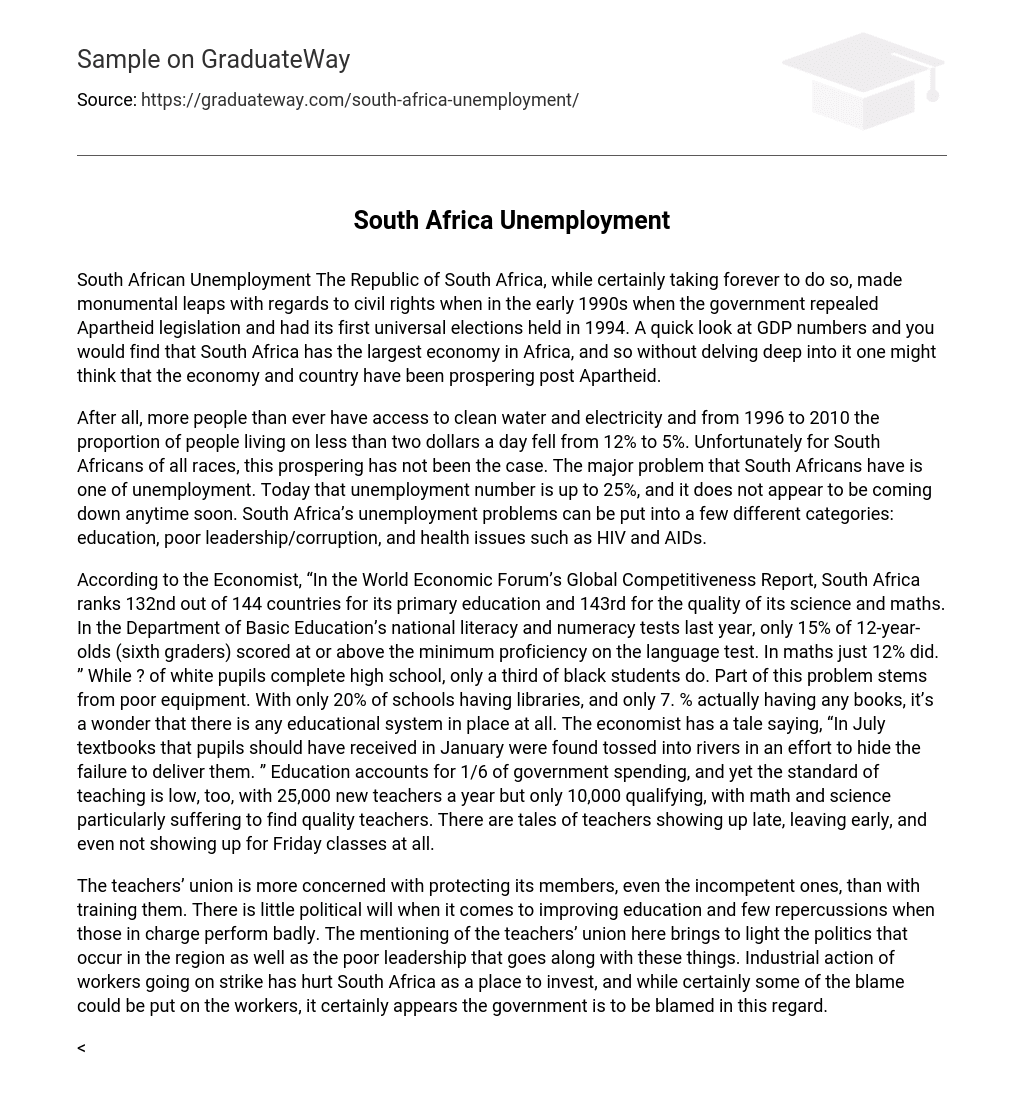Despite the long period of time, the Republic of South Africa made significant advancements in civil rights in the early 1990s. This included the repeal of Apartheid laws and the implementation of universal elections in 1994. By analyzing GDP data, it is clear that South Africa has the biggest economy among African nations. Therefore, it can be inferred that both the economy and the country as a whole have prospered since Apartheid came to an end.
Despite improvements in access to clean water and electricity, as well as a decrease in the poverty rate from 12% to 5% between 1996 and 2010, South Africans of all races have not equally benefited. Unemployment continues to be a significant issue with a rate of 25%, indicating no signs of improvement. The causes of unemployment in South Africa encompass education, inadequate leadership/corruption, and health problems such as HIV and AIDS.
According to the Economist, South Africa’s primary education is ranked 132nd out of 144 countries, with its science and maths quality ranking even lower at 143rd. Last year, the Department of Basic Education conducted national literacy and numeracy tests which revealed that language proficiency was achieved by only 15% of 12-year-olds, while just 12% achieved it in maths. The completion rates for high school vary significantly between white and black students: a certain percentage of white pupils finish high school compared to only a third of black students. This issue is exacerbated by inadequate equipment; only 20% of schools have libraries and a mere 7% possess any books. It is remarkable that an educational system manages to exist under these circumstances.
The Economist reports that textbooks meant for January were found in rivers during July, suggesting an effort to hide their failure to deliver. Despite allocating a significant portion of its budget to education, the government falls short in ensuring adequate teaching quality. Every year, 25,000 new teachers are hired, but only 10,000 meet the necessary qualifications for effective math and science education. Furthermore, there have been accounts of teachers being tardy, leaving early, or failing to hold classes on Fridays.
The teachers’ union is primarily focused on protecting its members, even if they are not competent, rather than ensuring they receive sufficient training. The region lacks determination to improve education and leaders who do not perform well face few repercussions. By mentioning the teachers’ union, it highlights the prevailing political dynamics and inadequate leadership in the area. Strikes carried out by employees involved in industrial action have had a negative impact on South Africa’s attractiveness as an investment destination. While workers share some responsibility, it is clear that a significant portion of blame also rests with the government.
The ANC, South Africa’s primary political party, has close relationships with labor unions. Nonetheless, the nation faces challenges in attracting investments due to unfavorable labor laws. Corruption is pervasive throughout the country, and rural communities perceive politics as their sole opportunity for advancement. Consequently, there is frequently fierce competition for political power that may result in violence. In KwaZulu-Natal province alone, 40 politicians have been killed in such incidents. Other provinces have also witnessed comparable violent episodes within their political domains.
According to the Economist, Lindiwe Mazibuko, leader of the opposition Democratic Alliance (DA) in parliament, has accused the ANC of establishing a group called “tenderpreneurs” who secure government contracts through their connections. The article highlights widespread bribery among lower-ranking officials and emphasizes that corruption’s impact on the country’s democracy is devastating. Furthermore, healthcare remains a prominent concern for South Africans.
In 2009, there were 330,000 children under the age of 15 living with HIV. The primary causes are heterosexual sex or transmission from mother to child. The large number of infected children has caused distress among even preteens and has had a negative impact on people’s motivation to work towards a better future. Currently, approximately 95,000 nursing positions in the public sector, almost half of the total jobs available, remain unfilled according to the South African Institute of Race Relations. This situation makes it challenging for many South Africans to have hope for the future and they heavily rely on government assistance. The consequences of HIV have already had significant effects on health, income, productivity, and caregiving abilities.
Despite overall negative changes, the expectation of increased equality between blacks and whites appears to be unfounded. While there have been a few success stories in which black individuals have prospered in the new economy, they represent only a small and privileged group. Following the end of Apartheid, South Africa’s gini coefficient was 9 on the scale. Surprisingly, over the next 18 years, this coefficient has steadily risen to reach 63 in 2009.
Data indicates that currently 29% of black individuals and 6% of white individuals are unemployed. Unfortunately, there is no sign of improvement in this situation. According to the Economist’s report on the Reserve Bank, South Africa is predicted to have a modest growth rate of 2.6% in 2012. Conversely, Nigeria and Angola have experienced significant growth rates up to 10%, starting from a lower initial level.
Despite its smaller size compared to other BRICS economies, South Africa is forecasted to be overtaken by Nigeria as the largest economy in Africa in the next ten years. At present, the country struggles with a significant youth unemployment rate of 50%, and individuals unemployed by age 24 often encounter obstacles in securing full-time employment. Moreover, South Africa faces numerous structural challenges pertaining to politics, education, and healthcare. It is imperative for the nation’s future success that these issues are directly addressed rather than postponed.
Sources
- http://www. economist. com/news/briefing/21564829-it-has-made-progress-becoming-full-democracy-1994-failure-leadership-means
- http://www. economist. com/news/letters/21565905-assisted-suicide-theological-south-africa-greece-afghanistan-china-pop-tunes
- http://www. avert. org/aidssouthafrica. htm http://www. infoplease. com/ipa/A0107983. html? pageno=1
- http://www. tradingeconomics. com/south-africa/unemployment-rate





